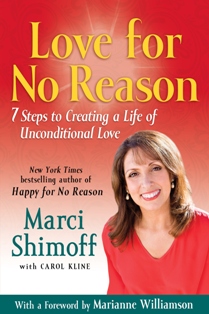Facing the great unknown? Here's some help. Many of us never leave our comfort zones unless we're forced to. So when we're confronted with a major change in life, our routine is broken and we're plunged into unknown waters. However, such upheavals can result in unexpected positive outcomes. "By going outside your comfort zone, you're gaining new experiences, meeting new people, gaining new knowledge and skills, and strengthening different parts of yourself," says Lauren Mackler, life coach and author of Solemate (Hay House)... To read the entire article on Body + Soul, click here.
Wholeness as a Way of Life
As many of you know, the foundation of my Illumineering Coaching work, workshops, and Solemate: Master the Art of Aloneness & Transform Your Life book is all about becoming whole—reclaiming and liberating your potential and living the personal and professional life to which you aspire. So I'm especially thrilled to share with you Carmen Harra's new release, Wholeliness, a beautiful book about wholeness and living in harmony with all that exists. I’ve long believed that reclaiming the innate wholeness with which each of us are born is a critical prerequisite for living a healthy, purposeful, and joyful life. And toward that end, I often recommend books that promote personal transformation. But as a long-time advocate and teacher of human wholeness, I'm especially thrilled to recommend and support the release of Carmen's beautiful new book. To order, click here.
Demystifying Sex Addiction
 It’s disheartening to me that so many people fail to view sex addiction as a SYMPTOM of much deeper issues. All addictions are misguided attempts to manage “pain” (self-loathing, anxiety, anger, etc.). Unless you address the roots of people’s pain, treatment won’t be effective. To read my interview with CNN about Anthony Weiner and sex addiction, click here.
It’s disheartening to me that so many people fail to view sex addiction as a SYMPTOM of much deeper issues. All addictions are misguided attempts to manage “pain” (self-loathing, anxiety, anger, etc.). Unless you address the roots of people’s pain, treatment won’t be effective. To read my interview with CNN about Anthony Weiner and sex addiction, click here.
Getting Unstuck - Huffington Post
 Do you dream of changing your life but feel stuck in your status quo? If so, read my article in the Huffington Post to help you get unstuck! To read the article, click here.
Do you dream of changing your life but feel stuck in your status quo? If so, read my article in the Huffington Post to help you get unstuck! To read the article, click here.
The Art of Ex-Etiquette
Lauren's Interview with Psychologies Magazine
 PM: When is the right time or when are you in the right place to resume a relationship with your ex?
PM: When is the right time or when are you in the right place to resume a relationship with your ex?
LM: If you are parents, it’s in your children’s best interest to co-parent in a civil and mutually-respectful manner. Divorce is always painful. When one parent demeans the other in front of the children it creates life-long, emotional and psychological wounds. If need be, seek out a therapist, mediator, or coach to help you devise a co-parenting plan and develop effective communication and conflict management skills. Ask yourself, “What’s more important—my anger and resentment or the health and well-being of my children?”
When one person still has romantic feelings or the desire to get back together as a couple and their ex doesn’t feel the same, friendship doesn’t work. The one longing to be a couple continuously feels rejected, which invokes feelings of guilt, frustration, and/or resentment in the other.
By the end of a relationship, many couples have become ‘intimate enemies’ and don’t even like the other person, let alone love them. There has to be a foundation of mutual respect, shared values, and appreciation of the other person. These are important in any friendship, but especially so when transitioning from a partnership to a friendship.
PM: Is it important to examine your motives for wanting to stay friends; for example, guilt, wanting to get back together, trying to make someone jealous, or the inability to let go? What sort of good motives are there for wanting to stay friends? Is it important that your motives and expectations are the same?
LM: Hidden agendas such as financial or material gain, fear of being alone, appearing desirable to others, or relieving guilt ultimately contaminate the friendship. When someone uses another person for their own gain, sooner or later the person being used becomes resentful and the relationship implodes. There has to be shared mutual benefit. These can include enjoying a close and supportive friendship with someone you care about and who cares about you, maintaining a shared social circle, or for ex’s who work together, being able to have a positive relationship at work.
PM: What should you do if when you’re together, your old feelings are reignited and you begin to want more than friendship? Should you back off and re-evaluate? Does this mean you may not be ready for friendship?
LM: Take the time to examine your feelings and what’s driving them. Are you missing the person or just your life as a couple? If it’s the latter, it’s time to learn how to live life on your own. If you find that you still have romantic feelings or you want to get back together, express how you feel to your ex to see how he or she is feeling. If they don’t feel the same and your feelings are creating more pain than joy in the relationship, let your ex know you need some distance and do the inner work to help you move on.
PM: What about sex? It’s not really an uncommon scenario! One of you is feeling raw, the other one comforts you, and you end up in bed. Is this something to be avoided at all costs in relationships which really are over, where at least from one side, there is no chance of reconciliation? Should there be other rules like no flirting, hand-holding, or spontaneous returns to intimate behavior? Or is it okay to do all this and throw out the rule book?
LM: It depends on the boundaries to which you’ve both agreed. There’s no right or wrong here, it’s what works for both people. The key is to keep the communication alive and keep checking in with your own feelings and to those of your ex. It’s important, however, to understand that once you’re back in bed together, the relationship is again a romantic, sexual relationship and not a platonic friendship. So how you both want to go forward needs to be discussed and negotiated once again.
PM: What about emotional boundaries? How close is too close? Is it important to keep the relationship free from emotional entanglement? Is it advisable not to lean on each other for emotional support, and spare each other the details of new relationships? Should you build another support network rather than with your ex—even if he or she was once the first person you’d turn to when you were down?
LM: In or out of a relationship, it’s important to develop your own self-sufficiency and independence, including having your own friends and support system. Your ex can be part of your support system, but being emotionally dependent on someone else is always a recipe for disaster.
Like with sex, emotional boundaries need to be communicated. Discuss how much contact and support you both want with and from each other. If there’s a disparity, work to find middle ground that will work for both of you. Talk about how you want to handle new people in your life. Some people are comfortable knowing all about their ex’s latest date, while others may not be ready to hear it.
PM: What about new partners? How much should they be expected to take? What if your new partner and ex don’t get along? What if your new partner tells you in plainest terms that he doesn’t like you seeing your ex? Do you think we are sometimes prone to a little game playing with our ex’s, using them to make new partners jealous, or using new partners to make our ex’s jealous?
LM: Introducing a new person into the equation can work if the two ex’s have established and maintained a healthy, platonic friendship over an extended period of time following their romantic break-up. In other words, they are truly just friends, and have had a friends-only relationship for a consistent length of time. If you broke up with your ex a month ago, it’s probably not going to work to bring him into your new relationship because you haven’t had time to solidify a new friendship-only relationship.
If you’ve actively shared a healthy, platonic friendship with your ex for a year or more since the break-up, give the new person in your life the opportunity to meet your ex, so she can be reassured that you’re truly just friends. If you’ve included your new lover in your friendship with your ex and they don’t click, respect their feelings and participate in the friendship with your ex on your own. In this situation, if your lover demands that you cut your ex out of your life, pay attention to this red flag. You may be dealing with someone who is insecure or emotionally immature.
PM: What do you think a healthy relationship with an ex would be?
LM: A mutually respectful and supportive relationship in which both parties genuinely enjoy each other’s company, but have a shared desire to be nothing more than friends.
WANT TO USE THIS INTERVIEW IN YOUR E-ZINE, BLOG, OR WEB SITE? You can, as long as you include this complete statement at the end of the article:
Lauren Mackler is a world-renowned coach, host of the LIFE KEYS radio show, and author of the international bestseller, Solemate: Master the Art of Aloneness & Transform Your Life. www.laurenmackler.com
Lauren's Life Keys
Solemate French Edition!
The Psychology of Success
Lauren Mackler's Interview with Doug Tribou for NPR
 NPR: How do you define success and what do you tell clients trying to define success in their own lives?
NPR: How do you define success and what do you tell clients trying to define success in their own lives?
LM: Success is subjective so it’s defined and experienced by people in different ways. It might be a certain amount of money or prestige, a large circle of friends, or a fulfilling personal life or career. I define success as being able to activate your strengths to produce the results you want to achieve.
NPR: What kind of advice would you give to someone near the top of his or her profession, but who can’t quite achieve that ultimate goal?
LM: Over the 20 some years I’ve spent coaching many types of clients, I've found that the two biggest barriers that hold people back are what I call their core limiting beliefs and habitual behaviors. When we’re born, we’re whole, integrated human beings with tremendous potential. In response to our life conditioning, we adopt thought and behavior patterns that often diminish our strengths and potential as adults.
For example, someone may be a gifted athlete, but a life-long, ingrained belief that he’s never quite good enough can keep him from reaching the top of his game. He’ll be distracted by a fear of failing, which then creates stress and makes it difficult to stay focused on his goals. To override those barriers, you have to become aware of how you think and behave on autopilot, and start aligning your thoughts and behaviors with the results you’re trying to achieve.
NPR: How do repeated “close-calls” with success impact the people falling short time and again?
LM: It depends on the type of person. The people who ultimately reach their goals are those who don’t give up. Instead of wallowing in self-pity or frustration—or throwing in the towel altogether—they explore what didn’t work and course-correct. It is human nature to feel upset or frustrated when we fall short, but the path to success more often than not involves making mistakes along the way and learning from them. If someone feels like they’ve failed, I encourage them to reframe the situation as an opportunity to learn about what doesn’t produce the outcome they want. Instead of giving up, brainstorm what might be a more effective approach and then implement the new strategy. To view Lauren's "Critical Factors of Success" video, click here.
WANT TO USE THIS INTERVIEW IN YOUR E-ZINE, BLOG, OR WEB SITE? You can, as long as you include this complete statement at the end of the article:
Lauren Mackler is a world-renowned coach, host of the LIFE KEYS radio show, and author of the international bestseller, Solemate: Master the Art of Aloneness & Transform Your Life. www.laurenmackler.com
Becoming Who You Already Are
 Each of us comes into the world as a whole, integrated human being. We’re born with innate personality traits, natural strengths and talents, and tremendous potential. Growing up, we respond to our life conditioning by adopting habitual roles, beliefs, and behaviors that often diminish our strengths and potential. These patterns follow us into adulthood, and they shape our feelings about ourselves, our relationships, our personal lives, and our careers.
In my Illumineering Coaching work—be it with individuals, couples, families, executives, or management teams—my fundamental mission is to help people figure out what’s keeping a lid on their potential, where it came from, and how to remove it. This involves identifying their innate personality traits, strengths, and potential—their Authentic Self—and the habitual role, beliefs, and behaviors of their Conditioned Self. We assess the disparity between the two selves, uncover their self-defeating patterns, and determine where they came from.
Each of us comes into the world as a whole, integrated human being. We’re born with innate personality traits, natural strengths and talents, and tremendous potential. Growing up, we respond to our life conditioning by adopting habitual roles, beliefs, and behaviors that often diminish our strengths and potential. These patterns follow us into adulthood, and they shape our feelings about ourselves, our relationships, our personal lives, and our careers.
In my Illumineering Coaching work—be it with individuals, couples, families, executives, or management teams—my fundamental mission is to help people figure out what’s keeping a lid on their potential, where it came from, and how to remove it. This involves identifying their innate personality traits, strengths, and potential—their Authentic Self—and the habitual role, beliefs, and behaviors of their Conditioned Self. We assess the disparity between the two selves, uncover their self-defeating patterns, and determine where they came from.
The next step is developing strategies for change. This entails learning how to think and act by deliberation instead of by default. Living by deliberation means intentionally aligning your thoughts, behaviors, and choices with who you really are and the outcomes you’re trying to achieve. When you’re living by default, you’re reacting on autopilot from old, conditioned patterns. And while those patterns may have made sense when you were little, they’re usually not very effective in producing the results you want as an adult.
Letting your Conditioned Self run your life is like continuously swimming upstream. It depletes your energy, stifles your strengths, keeps you settling for less than what you’re capable of creating, and undermines your relationships. Over time, the stress it produces can even weaken your immune system and compromise your physical health.
Shedding the shackles of your life conditioning and liberating who you already are will change your life. Instead of your energy being consumed by trying to be perfect, berating yourself, living up to other’s expectations, avoiding failure, dealing with conflict, numbing your pain, or managing fear, it’s available to discover what you like, take new risks, pursue your dreams, share positive relationships, and create the personal and professional life to which you aspire.
This type of personal and professional development work—delving into the roots of limiting patterns and taking action to produce tangible, lasting change—can be challenging, uncomfortable, or even painful for some people. But the 25 years that I’ve been doing this work—and the transformative results I’ve seen over and over again—has taught me two very important things: 1) the only way out is through, and 2) the journey is well-worth the ride.
WANT TO USE THIS ARTICLE IN YOUR E-ZINE, BLOG, OR WEB SITE? You can, as long as you include this complete statement at the end of the article:
© 2011 Lauren Mackler
Lauren Mackler is a world-renowned coach, host of the LIFE KEYS radio show, and author of the international bestseller, Solemate: Master the Art of Aloneness & Transform Your Life. www.laurenmackler.com
Family Coaching: The Wall Street Journal
“Lauren Mackler, the Boston life and executive coach who worked with the Sayers, gives clients the Myers-Briggs and the Life Styles Inventory. Ms. Mackler uses the tests to help family members see how problems might be driven by personality differences and come up with strategies to adjust…” To read the entire article in the Wall Street Journal, click here.
Are You Living Deliberately?
I was interviewed 3/29/11 on the Dr. Molly Barrow Radio Show about how to live deliberately and become the person you were born to be. To hear or download the episode, click here.
Are You Being Bullied?
Are you or someone you know being bullied?
 President Obama recently held a White House conference to discuss ways to prevent bullying in school. But bullying is a problem not just among young people. Workplace bullying can involve threats, baseless criticism, discrimination and favoring some employees unfairly over others. Life and executive coach, bestselling author, and CNN commentator, Lauren Mackler, offers tips for how to respond to a bully on Voice of America. To listen, click here.
President Obama recently held a White House conference to discuss ways to prevent bullying in school. But bullying is a problem not just among young people. Workplace bullying can involve threats, baseless criticism, discrimination and favoring some employees unfairly over others. Life and executive coach, bestselling author, and CNN commentator, Lauren Mackler, offers tips for how to respond to a bully on Voice of America. To listen, click here.
Liberate Your Authentic Self Workshop!
3/25-3/27, 2011 at Kripalu in Stockbridge, MA
 Imagine what life would be like if you could reclaim your innate strengths, free yourself from the limiting patterns that keep a lid on your potential, and fully activate your potential in every aspect of your life! That’s what this life-changing weekend promises! Join world-renowned coach, radio host, and bestselling author of Solemate: Master the Art of Aloneness & Transform Your Life, Lauren Mackler, to liberate your Authentic Self, unleash your potential, and create a life you love! For more information and registration, call 866.200.5203 or click here.
Imagine what life would be like if you could reclaim your innate strengths, free yourself from the limiting patterns that keep a lid on your potential, and fully activate your potential in every aspect of your life! That’s what this life-changing weekend promises! Join world-renowned coach, radio host, and bestselling author of Solemate: Master the Art of Aloneness & Transform Your Life, Lauren Mackler, to liberate your Authentic Self, unleash your potential, and create a life you love! For more information and registration, call 866.200.5203 or click here.
5 Keys to Optimal Fitness
 You want to be healthy and fit, so why aren't you living life in your ideal body?
There are lots of reasons that make weight loss a challenge for people, many of which go deeper than simply calories-in versus calories-out.
You want to be healthy and fit, so why aren't you living life in your ideal body?
There are lots of reasons that make weight loss a challenge for people, many of which go deeper than simply calories-in versus calories-out.
Below are 5 common obstacles to optimal health and solutions to unlock your best body ever.
It’s too much effort. Your habit may be to avoid pain and seek out pleasure. Unfortunately this works against you when trying to get fit. In your mind it's painful (or at least uncomfortable) to deny yourself the food you crave and to exert yourself with exercise. To overcome this obstacle, find something unpleasant about being overweight to motivate yourself towards healthy eating and exercise. Focus on the negative impact your current weight has on your health, self-esteem, and lifestyle. Convince yourself that the pain of being out of shape is much greater than the discomfort of losing weight.
You don't want to sacrifice the good stuff. Extra calories are not your only option to stimulate the pleasure center of your brain. Find an activity or two that you truly enjoy and indulge in those regularly. A walk outside, an uplifting book, a great movie, or a relaxing massage are great substitutes to invoke pleasure. You can also retrain your brain to actually crave the pleasure of exercise-induced endorphins.
You’re busy and overwhelmed. Like many people, you may work too much, over-commit, and lack enough sleep. The fast-paced way you live leaves you exhausted, stressed, and craving comfort food. You may even begin to feel too busy to take care of your health. If so, it's time to reprioritize. Let go of your perfectionist standards and remove a few commitments from your schedule so you’re able to cook healthy meals, exercise, and get a good night's sleep. Remind yourself that taking care of your health is not a luxury but a necessity.
You don't feel like you deserve it. Think back on the times you sabotaged your weight loss efforts. If you don't believe that you are worthy of your ideal physical state, then you'll never make this a reality. Changing feelings of unworthiness is critical to being able to maintain a healthy exercise and eating plan. Take the time to take care of yourself because you DO deserve it!
You feel afraid. You may feel afraid to start because you might fail. Or you may fear starting because you might succeed and change makes you uncomfortable—even if it's change in the right direction. Focus on all of the ways that losing weight will make your life better. Envision that better life everyday so that it goes from being new and scary to familiar and comfortable.
© 2011 Fitness Together Newton
Fitness Together provide fitness training studios helping people live better lives. Sign up for their free e-newsletter at FitnessTogether.com.
Interview with Preview Your Life
Interview with Solemate author Lauren Mackler on PreviewYourLife.com PYL: Do you use visualization, meditation or other techniques in mastering the art of aloneness and if so, please explain?
PYL: Do you use visualization, meditation or other techniques in mastering the art of aloneness and if so, please explain?
LM: When I attended my first personal-development workshop in 1982, I was introduced to visualization and affirmations. For years, I tried unsuccessfully to use visualization and affirmations to change myself and my life. What I ultimately figured out is that while these are powerful tools, it’s not enough to simply visualize a future state or say an affirmation to achieve transformation. It was only when I became aware of my self-defeating behaviors and the core limiting beliefs that were driving them—and implemented an action plan to develop new, self-supporting beliefs and behaviors—that I was finally able to achieve and sustain the personal transformation I wanted.
Another technique you mentioned that I have found tremendously valuable is meditation. Not only does it have many health benefits, but it’s great for reducing stress and keeping things in perspective.
PYL: What is your favourite quote and why?
LM: “Be the change you want to see in the world,” by Mahatma Gandhi. I love this quote because it speaks to a profound truth. Can you imagine what our world would be like if everyone adopted this as a way of living? We’re such creative beings that the world would be dramatically improved very quickly!
PYL: How important is knowing where you want to go to achieving it (co-creating), or do you believe in letting life lead you?
LM: I often say that where you focus is where you go. Most people go through their lives on autopilot, acting without thinking about the results of their actions, or the role they play in creating their lives. In Solemate, I have a chapter titled, Living Deliberately. This means living consciously in every moment so you can align your actions and choices with the life and experiences you want to have.
PYL: What is the #1 question people ask you and what is your response?
LM: People always ask me what inspired me to write Solemate. I married at 23 and built my life around my husband. I moved to his country, worked as a therapist in his business, and let him handle all our finances. So when my marriage fell apart, my life, job, and financial security collapsed right along with it. After hitting bottom, I sold everything I owned and returned with my children to the U.S. I was emotionally devastated and terrified, with no means to provide for myself or my children.
I knew I had to find a way out of my emotional and financial abyss. I created a “self-renewal program” for myself, comprised of daily activities and action steps that, over time, not only changed my life, but changed me. When I realized that my program could help others, I turned it into the Mastering the Art of Aloneness workshop, which I’ve been teaching at Kripalu, Omega, and other centers for several years. Eventually, someone suggested turning the workshop into a book, which became Solemate.
PYL: What is the question you wish people would ask you and your response?
LM: I often have clients in my coaching practice who are unhappily single. In the initial session, they typically express how lonely they feel and ask me how they can find a mate. My answer is always that instead of looking to someone else to transform your life—that special person who will make you feel happy and whole—it makes more sense to focus on making yourself whole. The question isn’t, “How do I find my soul mate so I can have the life I want?” The better question is: “What do I need to do to create the life I want for myself?” That way, instead of waiting for someone to make your live happen, you’re busy making your life happen. Not only will it make for a joyful and fulfilling life on your own, but if you do engage in a committed relationship or marriage, you’re coming into it from a place of wholeness, versus from a place of lack.
WANT TO USE THIS INTERVIEW IN YOUR E-ZINE, BLOG, OR WEB SITE?
You can, as long as you include this complete statement at the end of the article:
Lauren Mackler is a world-renowned coach, host of the Life Keys radio show, and author of the international bestseller Master the Art of Aloneness & Transform Your Life. Sign up for her free Live Boldly e-newsletter at www.laurenmackler.com.
Lauren Recommends: What Does That Mean?
 What Does That Mean? by Eldon Taylor
What Does That Mean? Exploring Mind, Meaning and Mysteries by New York Times bestselling author Eldon Taylor is an in-depth exploration of the mind, meaning, and life’s mysteries. It's a unique and inspiring book that not only explains many of life’s uncertainties, but provides a pathway to greater emotional healing. Order the new paperback today and receive free gifts from me and other thought leaders! Click here to order.
What Does That Mean? by Eldon Taylor
What Does That Mean? Exploring Mind, Meaning and Mysteries by New York Times bestselling author Eldon Taylor is an in-depth exploration of the mind, meaning, and life’s mysteries. It's a unique and inspiring book that not only explains many of life’s uncertainties, but provides a pathway to greater emotional healing. Order the new paperback today and receive free gifts from me and other thought leaders! Click here to order.
A New Year’s Recipe for Success
 Each January, millions of people resolve to change themselves, their careers, or their relationships. In fact, many of the resolutions they make are identical to the ones they made the previous year! Whether your goal is to make more friends, land a new job, or treat yourself with greater compassion, a critical key to achieving success lies in your ability to activate your potential to create the results you seek.
In my work, I often talk about the power of our life conditioning—the environment in which we were raised, and the role modeling and experiences to which we were exposed while growing up. In response to our life conditioning—and by about the age of seven—we internalize a set of core beliefs about ourselves and the world that embed within our subconscious. Although most people aren’t even aware of them, these core beliefs shape who we become, how we behave, and the lives we live. But while those beliefs and behaviors helped us to function within our families growing up, they often keep a lid on our potential and keep us from achieving what we want as adults.
Each January, millions of people resolve to change themselves, their careers, or their relationships. In fact, many of the resolutions they make are identical to the ones they made the previous year! Whether your goal is to make more friends, land a new job, or treat yourself with greater compassion, a critical key to achieving success lies in your ability to activate your potential to create the results you seek.
In my work, I often talk about the power of our life conditioning—the environment in which we were raised, and the role modeling and experiences to which we were exposed while growing up. In response to our life conditioning—and by about the age of seven—we internalize a set of core beliefs about ourselves and the world that embed within our subconscious. Although most people aren’t even aware of them, these core beliefs shape who we become, how we behave, and the lives we live. But while those beliefs and behaviors helped us to function within our families growing up, they often keep a lid on our potential and keep us from achieving what we want as adults.
To achieve your New Year Resolutions—or any other goals you set for yourself—it’s critical to unearth your own limiting beliefs and the self-defeating behaviors that can sabotage your success. Below are two examples of how patterns learned in childhood impact our adult lives:
I’m Not Good Enough
If you were raised in a family where you were frequently criticized, there’s a good chance that one of your core limiting beliefs is: I’m not good enough. In response, you may have adopted the habitual behavior of always flying under the radar and keeping quiet to protect yourself. As an adult, you may withhold your real feelings and needs from your partner, allow others to treat you poorly, or stay in an unsatisfying job out of fear of failure.
I Have No Control
If you tend to be argumentative or overly controlling, the limiting belief: I am powerless and have no control may be at play. You may have had a dominating parent, or gone through a painful event that was beyond your control such as loss of a loved one or a parental divorce. This pattern not only produces unwelcome reactions in others, but it can wreak havoc in people’s lives. Controllers’ energy is often consumed by conflict, and they can have difficulty keeping jobs or maintaining harmonious relationships with others.
To reclaim your potential and develop the inner resources needed to realize your goals, start by being aware of your self-sabotaging patterns. Invoke your inner observer by noticing how you behave on autopilot. Then, without judging yourself, start to unearth the core beliefs that are driving those behaviors. Once you’ve identified your self-defeating patterns, the next step is to replace them with new, self-supporting beliefs and behaviors. With time, perseverance, and patience, the new patterns of thought and behavior will take hold, and give you the inner support you need to pursue and achieve your goals.
To watch Lauren's video about the critcal factors for success, click here!
WANT TO USE THIS ARTICLE IN YOUR E-ZINE, BLOG, OR WEB SITE? You can, as long as you include this complete statement at the end of the article:
© 2011 Lauren Mackler
Lauren Mackler is a world-renowned coach, host of the LIFE KEYS radio show, and author of the international bestseller, Solemate: Master the Art of Aloneness & Transform Your Life. www.laurenmackler.com
Lauren Recommends: Flash Foresight
 Flash Foresight by Daniel Burrus
Flash Foresight: How to See the Invisible and Do the Impossible shows you how to re-invent your business because if you don’t, someone else will! International bestselling author, Daniel Burrus, has been predicting trends for more than 25 years—and has been right! Order the book today and receive free gifts from me and many other leading visionaries! Click here to order.
Flash Foresight by Daniel Burrus
Flash Foresight: How to See the Invisible and Do the Impossible shows you how to re-invent your business because if you don’t, someone else will! International bestselling author, Daniel Burrus, has been predicting trends for more than 25 years—and has been right! Order the book today and receive free gifts from me and many other leading visionaries! Click here to order.
How to Manage Your Boss
10 pieces of advice your boss won't tell you!By Woman’s Day
Follow her lead. If you’re not sure whether your boss prefers to communicate in a meeting or via email or phone, ask, suggests career and executive coach Lauren Mackler. Also ask what she wants to be consulted on and what she prefers you handle on your own. And take cues from her personality, says Mackler: If your boss is introverted, don’t keep pushing for face-to-face time. Toot your own horn. Your boss can’t possibly keep tabs on what every employee is doing every day—it’s up to you to let him know! “When you wrap up a project, send a congratulatory email to your team and CC your boss,” suggests Mackler. You might also send him a monthly overview of the projects you’ve completed and other accomplishments, and have these month-to-month emails on hand at your annual performance review. And speaking of performance reviews…click here to read the entire article.
Lauren Recommends: Love for No Reason
 Love for No Reason by Marci Shimhoff
Bestselling author Marci Shimhoff’s wonderful new book, Love For No Reason: 7 Steps To Creating A Life of Unconditional Love, provides practical tools for experiencing brilliant, warmth-filled love within yourself, sensing it in the world around you, and sharing that love more fully with others. Order the book today and receive free gifts from me and many others! Click here to order.
Love for No Reason by Marci Shimhoff
Bestselling author Marci Shimhoff’s wonderful new book, Love For No Reason: 7 Steps To Creating A Life of Unconditional Love, provides practical tools for experiencing brilliant, warmth-filled love within yourself, sensing it in the world around you, and sharing that love more fully with others. Order the book today and receive free gifts from me and many others! Click here to order.






